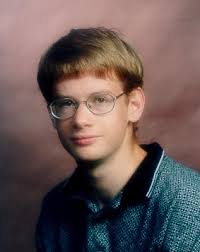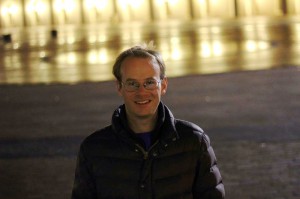Gabriel Carroll ’01

Tech struggled with a lot of the usual difficulties of urban schools – drugs, violence, bomb threat hoaxes. I remember a period when someone was lighting fires in garbage cans every few weeks. But I felt Tech was a place with powerful ambitions– academically, of course, and also in terms of the sense of identity and citizenship it sought to instill in its alumni. My life at that time centered on national and international math contests.
I remember getting a lot of support from my classmates and teachers. Abstractly, I knew many of my classmates had more challenging experiences than I did, but it was hard for me to understand what this meant. If I could live those years again, I’d work much harder at understanding my classmates’ backgrounds, and how their experiences – in the same rooms with the same books– differed from mine. Most of my subsequent life has been in the ivory tower (I’m now an assistant professor at a private university not so far away).
After graduating from Tech and arriving at Harvard, one of the first things that shocked me was how many white people there were. These days the problems I deal with day to day are abstract, and the people I interact with tend to come from the luckier slices of society. I’m thankful to have gone to an urban public high school, to be reminded that most people’s experiences are different from mine.
An assistant Professor of Economics at Stanford University, Carroll graduated from Harvard with B.A. in mathematics and linguistics in 2005 and received his doctorate in economics from MIT in 2012. He was recognized as a child prodigy and received numerous awards in mathematics while a student.
Carroll won two gold medals (1998, 2001) and a silver medal (1999) at the International Mathematical Olympiad, earning a perfect score at the 2001 International Mathematical Olympiad held in Washington, D.C., shared only with American teammate Reid W. Barton and Chinese teammates Liang Xiao and Zhiqiang Zhang.
Gabriel earned a place among the top five ranked competitors (who are themselves not ranked against each other) in the William Lowell Putnam Competition all four years that he was eligible (2000–2003), a feat matched by only seven others (Don Coppersmith (1968–1971), Arthur Rubin (1970–1973), Bjorn Poonen (1985–1988), Ravi Vakil (1988–1991), Reid W. Barton (2001–2004), Daniel Kane (2003–2006), and Brian R. Lawrence (2007–08, 2010–11). His top-5 performance in 2000 was particularly notable, as he was officially taking the exam in spite of only being a high school senior, thus forfeiting one of his years of eligibility in college. He was on the first place Putnam team twice (2001–02) and the second place team once (2003).

He has earned numerous awards in science and math, including the Intel Science Talent Search, has taught numerous mathematics classes and tutorials, and plays the piano. He was a Research Science Institute scholar in 2000.
Gabriel was inducted into the charter class of Oakland Tech’s Hall of Honor in 2015.
